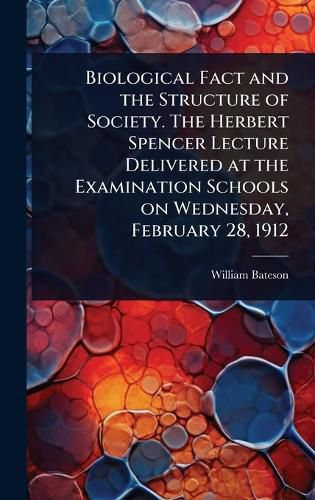Readings Newsletter
Become a Readings Member to make your shopping experience even easier.
Sign in or sign up for free!
You’re not far away from qualifying for FREE standard shipping within Australia
You’ve qualified for FREE standard shipping within Australia
The cart is loading…






This title is printed to order. This book may have been self-published. If so, we cannot guarantee the quality of the content. In the main most books will have gone through the editing process however some may not. We therefore suggest that you be aware of this before ordering this book. If in doubt check either the author or publisher’s details as we are unable to accept any returns unless they are faulty. Please contact us if you have any questions.
In "Biological Fact and the Structure of Society," William Bateson delivers a compelling argument concerning the interplay between biological understanding and societal organization. Originally presented as the Herbert Spencer Lecture in 1912, this discourse delves into the implications of biological realities for social theory. Bateson, a pioneering geneticist, explores the extent to which biological principles should inform our understanding and structuring of human society.
Bateson challenges simplistic applications of biological analogies to social phenomena, urging a nuanced approach that acknowledges both the potential insights and inherent limitations of such comparisons. This lecture serves as a valuable historical snapshot of early 20th-century thought on biology, society, and the complex relationship between scientific knowledge and social policy. Readers interested in the history of science, sociology, and the intellectual debates surrounding eugenics will find this lecture particularly insightful.
This work has been selected by scholars as being culturally important, and is part of the knowledge base of civilization as we know it. This work was reproduced from the original artifact, and remains as true to the original work as possible. Therefore, you will see the original copyright references, library stamps (as most of these works have been housed in our most important libraries around the world), and other notations in the work.
This work is in the public domain in the United States of America, and possibly other nations. Within the United States, you may freely copy and distribute this work, as no entity (individual or corporate) has a copyright on the body of the work.
As a reproduction of a historical artifact, this work may contain missing or blurred pages, poor pictures, errant marks, etc. Scholars believe, and we concur, that this work is important enough to be preserved, reproduced, and made generally available to the public. We appreciate your support of the preservation process, and thank you for being an important part of keeping this knowledge alive and relevant.
$9.00 standard shipping within Australia
FREE standard shipping within Australia for orders over $100.00
Express & International shipping calculated at checkout
Stock availability can be subject to change without notice. We recommend calling the shop or contacting our online team to check availability of low stock items. Please see our Shopping Online page for more details.
This title is printed to order. This book may have been self-published. If so, we cannot guarantee the quality of the content. In the main most books will have gone through the editing process however some may not. We therefore suggest that you be aware of this before ordering this book. If in doubt check either the author or publisher’s details as we are unable to accept any returns unless they are faulty. Please contact us if you have any questions.
In "Biological Fact and the Structure of Society," William Bateson delivers a compelling argument concerning the interplay between biological understanding and societal organization. Originally presented as the Herbert Spencer Lecture in 1912, this discourse delves into the implications of biological realities for social theory. Bateson, a pioneering geneticist, explores the extent to which biological principles should inform our understanding and structuring of human society.
Bateson challenges simplistic applications of biological analogies to social phenomena, urging a nuanced approach that acknowledges both the potential insights and inherent limitations of such comparisons. This lecture serves as a valuable historical snapshot of early 20th-century thought on biology, society, and the complex relationship between scientific knowledge and social policy. Readers interested in the history of science, sociology, and the intellectual debates surrounding eugenics will find this lecture particularly insightful.
This work has been selected by scholars as being culturally important, and is part of the knowledge base of civilization as we know it. This work was reproduced from the original artifact, and remains as true to the original work as possible. Therefore, you will see the original copyright references, library stamps (as most of these works have been housed in our most important libraries around the world), and other notations in the work.
This work is in the public domain in the United States of America, and possibly other nations. Within the United States, you may freely copy and distribute this work, as no entity (individual or corporate) has a copyright on the body of the work.
As a reproduction of a historical artifact, this work may contain missing or blurred pages, poor pictures, errant marks, etc. Scholars believe, and we concur, that this work is important enough to be preserved, reproduced, and made generally available to the public. We appreciate your support of the preservation process, and thank you for being an important part of keeping this knowledge alive and relevant.